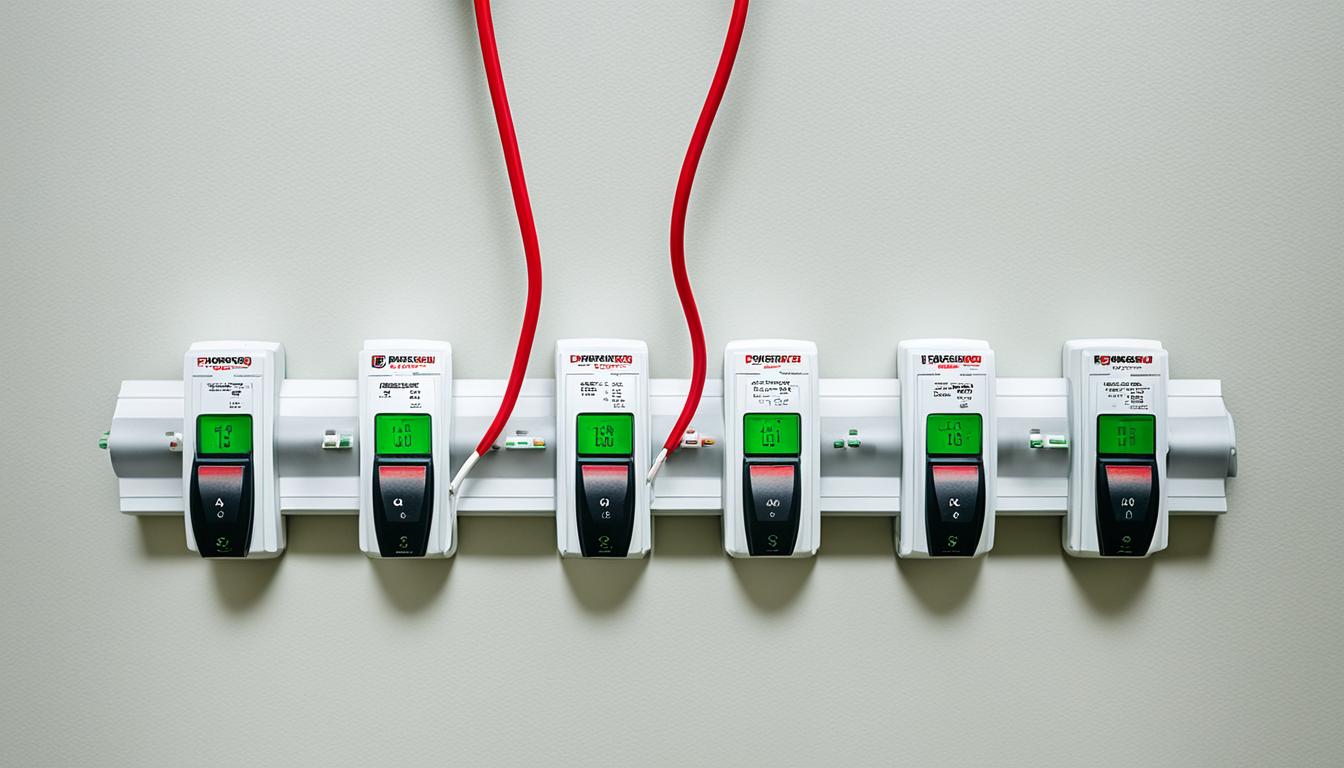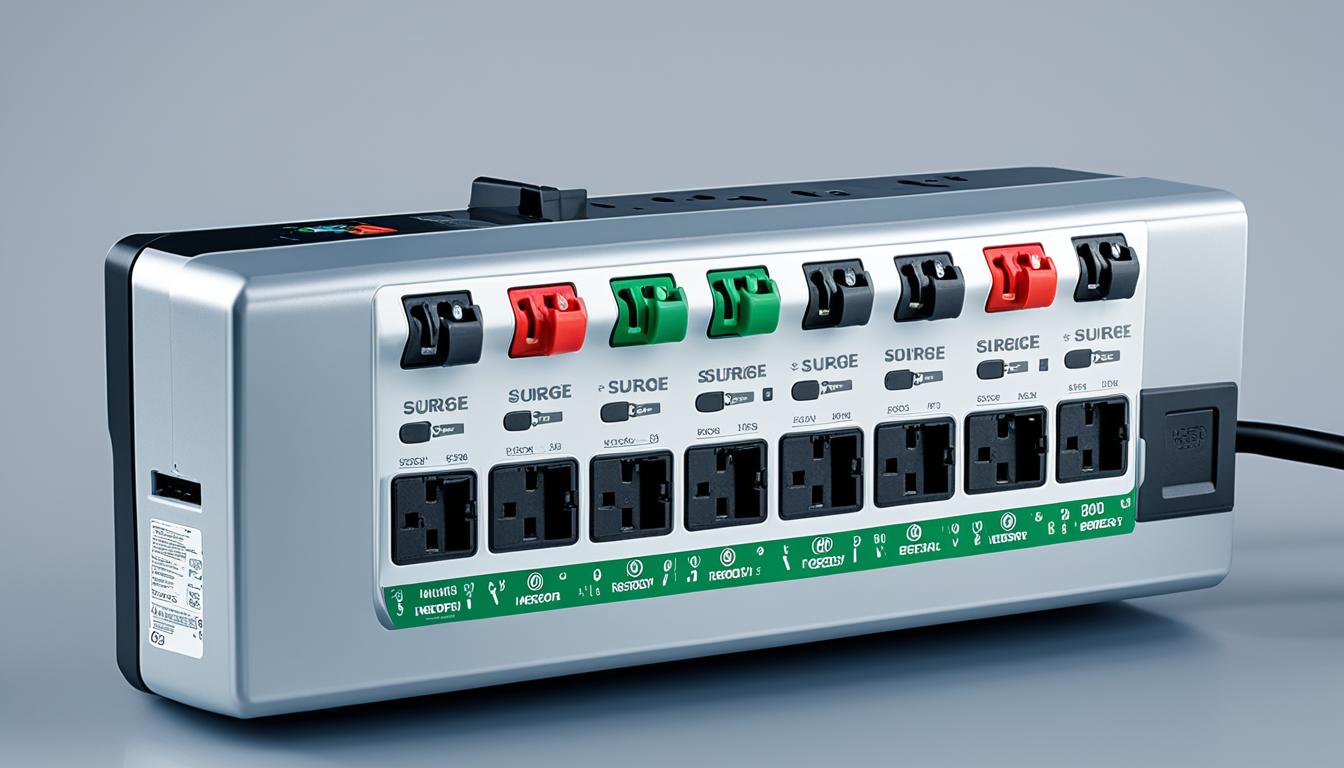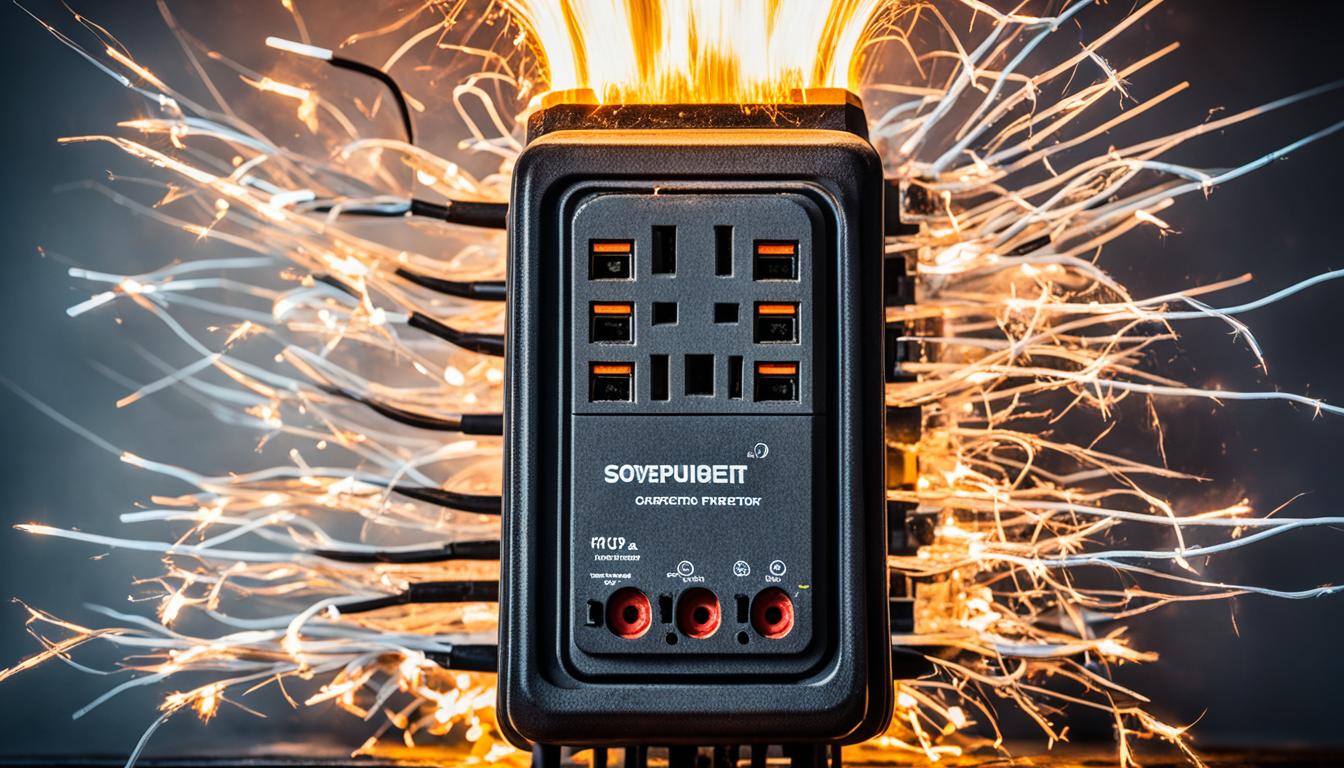extensioncords.site and its partners may earn a commission if you purchase a product through one of our links
When it comes to plugging an air conditioner into an extension cord, there are important considerations to keep in mind. Using an extension cord with an air conditioner can pose safety risks and should only be done in specific circumstances. Let’s explore the factors to consider and the best practices for using an extension cord with your air conditioner.
Key Takeaways:
- Using an extension cord with an air conditioner can be dangerous if not done properly.
- Not all extension cords are suitable for use with air conditioners.
- Choose the right extension cord based on your unit’s power efficiency, amperage requirements, and wire gauge.
- Follow safety measures when using an extension cord and consider alternative options.
- Prioritize safety by reviewing your unit’s specifications and seeking professional advice when needed.
Using an extension cord with an air conditioner requires careful consideration and adherence to safety guidelines. Whether you need to plug in a window air conditioner or a portable unit, it’s essential to understand the potential risks and choose the right extension cord for your specific situation.
Why Using the Wrong Extension Cord Can Be Dangerous
When it comes to plugging an air conditioner into an extension cord, it’s important to understand that not all extension cords are created equal. Air conditioners have high power needs, and using the wrong type of cord can lead to serious safety risks.
Standard extension cords are not designed to handle the power requirements of an air conditioner. They may not be able to transfer the necessary electric current without causing strain on the AC unit’s motor. This can result in overheating, electrical fires, and other hazards that put your home and family at risk.
“Using an improper extension cord may cause the cord to overheat and melt or, in a worst-case scenario, may even result in an electrical fire.”
Using a heavy-duty extension cord specifically designed for air conditioners is crucial for ensuring safety and proper functionality. These extension cords have thicker wires, higher amp ratings, and can handle the increased power demands of an air conditioner.
It’s always recommended to refer to the manufacturer’s instructions or consult with a qualified electrician to ensure you are using the correct extension cord for your air conditioner. Failing to use the right cord can have severe consequences, and it’s not worth risking your safety or the integrity of your AC unit.
Now that we understand why using the wrong extension cord can be dangerous, let’s explore how to select the right extension cord for your air conditioner in the next section.
Comparison of Extension Cords for Air Conditioners
| Extension Cord Type | Wire Gauge | Amp Rating | Length |
|---|---|---|---|
| Standard Extension Cord | 16 or higher | 10-15 amps | Up to 25 feet |
| Air Conditioner Extension Cord | 12 or lower | 15-20 amps | Up to 50 feet |
Selecting the Right Extension Cord for Your Air Conditioner
When it comes to choosing an extension cord for your air conditioner, it’s crucial to consider several key factors. By taking these considerations into account, you can ensure the safe and efficient operation of your AC unit while minimizing potential risks.
In order to select the most suitable extension cord for your air conditioner, start by determining your unit’s power efficiency. This information can typically be found in the owner’s manual. Understanding your unit’s power efficiency will help you choose an extension cord that is compatible with your AC’s power needs.
Another important consideration is the amperage requirements of your air conditioner. Make sure to check the amp ratings of both your AC unit and the extension cord, and ensure that they match. Using an extension cord with lower amp ratings than what your AC unit requires can lead to overheating and potentially damage both the cord and the appliance.
The wire gauge of the extension cord is also a critical factor to consider. The lower the gauge number, the thicker the wire. It is generally recommended to use a 12-gauge extension cord for most air conditioner units. However, larger units may require a higher gauge to ensure proper power transfer and reduce the risk of overheating.
Additionally, it’s important to minimize the length of the extension cord. Longer cords can result in increased resistance, which can cause overheating and higher power usage. Opt for a cord with a length that is just enough to connect your air conditioner to the nearest power outlet.
Ensuring the safety and performance of your air conditioner is essential when using an extension cord. Taking the time to select the right cord for your unit’s power needs will help prevent potential hazards while allowing you to conveniently plug your air conditioner into an appropriate power source.
Summary of Important Considerations:
| Consideration | Importance |
|---|---|
| Power Efficiency | Indicated in the owner’s manual, it helps you select a compatible extension cord. |
| Amperage Requirements | Ensure the extension cord’s amp ratings match the minimum amperage needed by your air conditioner. |
| Wire Gauge | Use a lower gauge number for a thicker wire, typically a 12-gauge extension cord is suitable for most units. |
| Length | Minimize the length of the extension cord to reduce resistance and potential hazards. |
Safety Measures When Using an Extension Cord with Your Air Conditioner
While it is possible to use an extension cord with your air conditioner, it should only be considered as a temporary solution or a last resort. In order to ensure your safety, there are important measures that need to be followed when using an extension cord with your air conditioner.
First and foremost, it is crucial to use an extension cord with three prongs for proper grounding. Avoid using two-prong cords, as they lack this essential safety feature. The grounding prong provides protection against electrical shocks, making it an indispensable feature for your AC unit.
Regularly inspect the extension cord and the outlet to ensure they are not getting warm. If you notice any signs of heat, it could be an indication of an overloaded circuit, which can lead to electrical hazards. Make sure to promptly address any issues concerning overheating.
Avoid hiding the extension cord under furniture or rugs. This can cause the cord to overheat and potentially lead to a fire hazard. Keeping the cord exposed and unobstructed allows for proper heat dissipation and prevents any potential damage.
“Using an extension cord with an air conditioner should only be a temporary solution or a last resort.”
Never use multiple extension cords or power strips to increase the length of the cord. This can result in a reduced voltage supply to your air conditioner and increased resistance, potentially causing damage to your unit and compromising its performance.
By adhering to these safety measures, you can minimize the risks associated with using an extension cord with your air conditioner, ensuring a safe and comfortable cooling experience.
Comparison of Extension Cord Types
| Type of Extension Cord | Suitable for Air Conditioners? | Power Capacity | Recommended Usage |
|---|---|---|---|
| Standard Household Extension Cord | No | Generally low | Light-duty electrical devices, such as lamps or chargers |
| Heavy-Duty Extension Cord | Yes | High | Air conditioners, power tools, and other heavy electrical devices |
| Outdoor Extension Cord | Yes | High | Outdoor electrical equipment, including air conditioners |
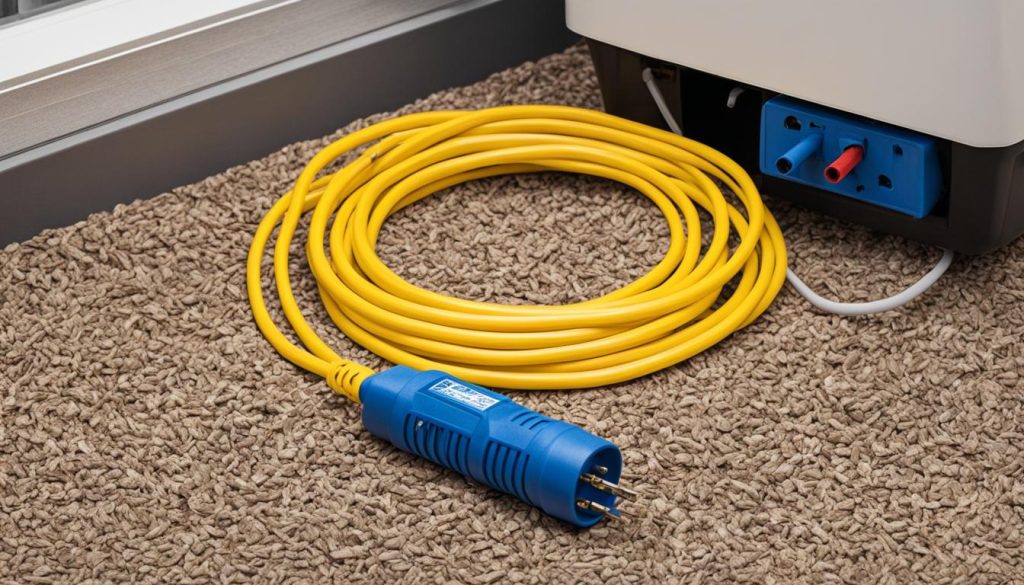
Alternatives to Using an Extension Cord with Your Air Conditioner
Instead of relying on an extension cord, there are alternative options available to safely power your air conditioner. Here are a few alternatives to consider:
- Replace the original power cord: One option is to replace the original power cord of your air conditioner with a longer one. This can be a non-invasive solution that eliminates the need for an extension cord altogether. By using a longer power cord, you can easily reach an electrical outlet without compromising safety. Just make sure to choose a cord that meets the necessary safety standards and is suitable for your air conditioner’s power requirements.
- Install a new electrical outlet: Another alternative is to have a new electrical outlet installed closer to your air conditioner. This provides a convenient and safe way to plug in your unit without the need for an extension cord. Hiring a professional electrician to install the outlet ensures that it is properly wired and meets all electrical codes. Not only does this provide a dedicated power source for your air conditioner, but it also eliminates any potential safety risks associated with using an extension cord.
- Consider a portable air conditioner: Portable air conditioners can be a suitable alternative for those who need instant cooling comfort without the hassle of extension cords. These units are designed to be easily moved from room to room and typically come with a built-in power cord that plugs directly into a standard electrical outlet. Portable air conditioners offer flexibility and convenience while maintaining safety standards.
By exploring these alternatives, you can find a solution that best fits your needs without compromising safety. Whether it’s replacing the power cord or opting for a portable unit, there are options available to provide efficient and reliable cooling for your space.
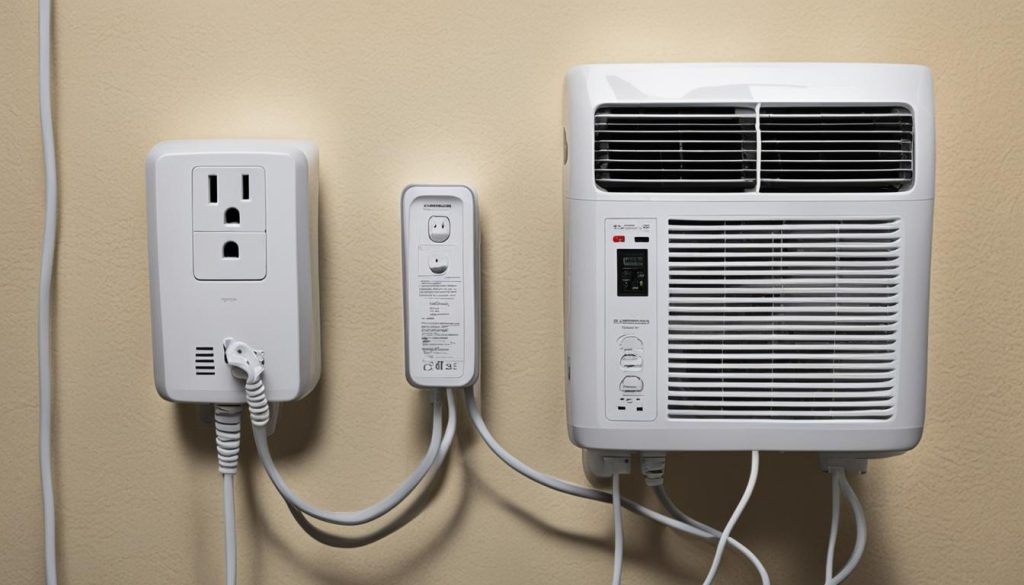
Making the Right Choice for Your Air Conditioner’s Power Needs
When it comes to powering your air conditioner, it’s important to make the right choices to ensure safety and efficiency. If you find yourself needing an extension cord, it’s crucial to select one that meets the necessary requirements. Start by carefully reviewing your air conditioner’s specifications and determine the best course of action for its power needs.
If using an extension cord is the only solution, choose one with a three-prong plug to ensure proper grounding. Consider the appropriate length of the cord, ensuring it reaches your desired outlet without excessive extra length. Pay attention to the amp ratings on both the air conditioner and the extension cord, ensuring they match and can handle the necessary power load.
Additionally, be mindful of the wire gauge of the extension cord. For most units, a 12-gauge cord is recommended, but larger units may require a higher gauge. Regularly check the extension cord for any signs of damage, and if any are found, replace it promptly to prevent any potential hazards. Finally, prioritize safety by avoiding overloading circuits, using proper grounding techniques, and always seeking professional advice when needed.
By making the right choice for your air conditioner’s power needs, including selecting the appropriate extension cord and following safety precautions, you can effectively and safely power your air conditioner without compromising on performance or risking any potential hazards.
FAQ
Can an air conditioner be plugged into an extension cord?
Yes, an air conditioner can be plugged into an extension cord, but it should only be done as a temporary solution and as a last resort. Safety measures must be followed to avoid electrical hazards.
Why is using the wrong extension cord dangerous for an air conditioner?
Using the wrong extension cord can lead to overheating, electrical fires, and other safety hazards. The extension cord should be able to handle the high power needs of the air conditioner without causing strain on the unit’s motor.
How do I select the right extension cord for my air conditioner?
When selecting an extension cord for your air conditioner, consider the unit’s power efficiency, amperage requirements, and wire gauge. Choose an extension cord with the appropriate amp ratings, wire gauge, and length.
What safety measures should I take when using an extension cord with my air conditioner?
Always use a three-prong extension cord for proper grounding, avoid hiding the cord under furniture or rugs, and monitor the cord and outlet for signs of overheating. Do not use multiple extension cords or power strips to increase the cord’s length.
Are there alternatives to using an extension cord with my air conditioner?
Yes, alternatives include replacing the power cord with a longer one or having a new electrical outlet installed closer to your unit. Portable air conditioners can also be used as an alternative solution.
How can I make the right choice for my air conditioner’s power needs?
Review your air conditioner’s specifications and consider options such as using an appropriate extension cord or exploring alternative power solutions depending on your unit’s power requirements. Prioritize safety by adhering to recommended guidelines.
